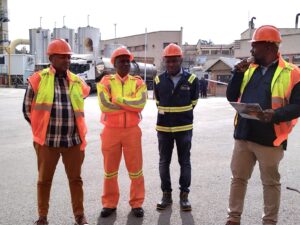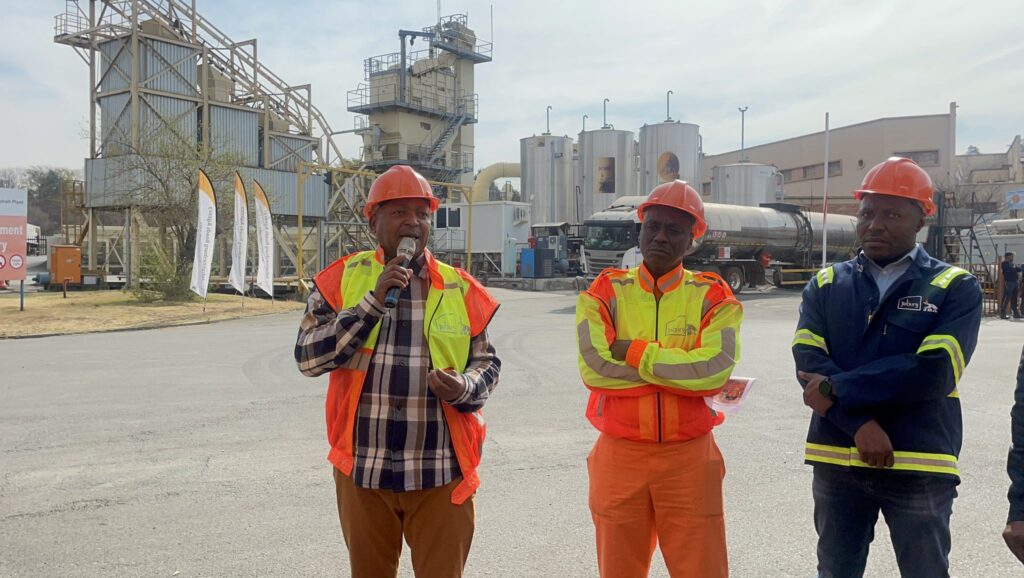By: ANG Reporter
City of Joburg member of mayoral committee for Roads and Transport Councillor Kenny Kunene on Thursday announced the recommissioning of Johannesburg Road Agency (JRA) asphalt plant in Booysens, following a year of no production.
The plant, which produces asphalt used for
the City’s road construction and repairs, was closed in August 2022 due to technical and operational challenges, including no appointed bitumen supplier. Bitumen is a key ingredient in asphalt production.

“The recommissioning of JRA’s asphalt plant is a significant achievement,” said Member of the Mayoral Committee for Transport, Councillor Kenny Kunene “JRA no longer has to rely on third parties for the supply of hot and cold mix to fix potholes and resurface roads. With this plant now fully operational, service delivery for road maintenance including pothole repairs will be greatly improved benefitting all road users, while easing movement of people and goods.”
The JRA is following a structured approach to road management and Visual Condition Assessment informs our response plan that prioritises the preservation of existing road infrastructure, keeping it in good condition and not allowing it to deteriorate to a poor condition. Our response plan includes proactive maintenance, including pothole repairs and crack sealing as well as roads resurfacing, all of which uses asphalt. Road resurfacing is an ongoing programme of works and forms part of the City’s continued commitment to investing in and improving the road network of the City of Johannesburg. This financial (2023/24) year the JRA will spend R111m resurfacing 112 lane kilometres of the road network.
According to the JRA’s visual condition assessment undertaken on the City’s road network, 2852km of these roads require resurfacing and 3968km are in a poor to very poor condition and require reconstruction.
The city is presently faced with an R11.8 billion backlog required for surfacing and gravel roads upgrades. A total of R7.1 billion is required for improving the City’s condition of surfaced roads to a good condition and R4.7 billion for the upgrading of gravel roads to tar. Despite the budget challenges, we are committed to providing quality roads for the people of Johannesburg, and the recommissioning of this asphalt plant will play a major role in achieving that goal,” Kunene concluded.

JRA Acting Chief Executive Officer Zweli NYATHI said: “We are pleased to announce the finalisation of a new bitumen supplier and that today our asphalt plant is being recommissioned to full operation. This is a major milestone for the City, as it will allow JRA to resume self-provision of asphalt for our road maintenance and construction projects. This will save us money and improve the efficiency of our operations.”
The JRA’s asphalt plant has a production capacity of 200 tonnes per hour and 1520 tonnes per day. This means that it can produce enough asphalt to resurface approximately 2.5 km of road per day.
Asphalt hot mix is used for permanent road repairs, resurfacing and construction while a cold bagged mix is used as a temporary repair in emergency situations. The cold mix plant is now also up and running producing 40 bags of cold mix per ton on demand. The new asphalt plant was built in 2018 after the old plant which dated back to the 1960’s become a health hazard due to polluted emissions and was too inefficient to meet the asphalt demands of the City’s Road maintenance and infrastructure programmes.
Asphalt tar roads make up 12 431km of Johannesburg’s 13 599km road network. The JRA conducts regular visual condition assessments to determine the condition of the city’s road. network. In general, South African roads have a 25-year lifespan with regular intervals of maintenance required.
Factors that contribute to the deterioration of roads include severe weather conditions, lack of proactive maintenance, lack of storm water maintenance, overloading of heavy vehicles, and uncontrolled excavations on the road network for new services.







